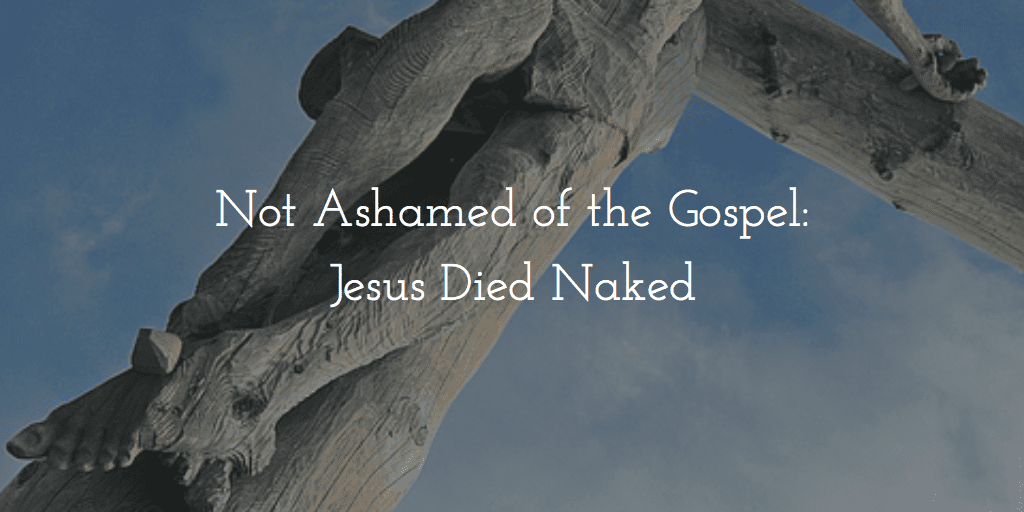 Jesus died naked.
Jesus died naked.
Despite what the religious paintings and icons tell you, I think it’s important to remember that the Son of God left the world the way He entered it.
Naked and exposed, hanging at eye level on a hill with a lot of foot traffic. The Romans did crucifixions like this on purpose.
Because the point of the crucifixion wasn’t just about violence, it was about shame.
I wrote last week, that too often, Christians today are fooled into thinking of we’re just one of the world religions, without realizing that the central claim of Christianity is oddly irreligious at its center.
There is a reason that Christian artists have felt pressure to paint a dying Jesus with clothes on. Because we are trying to add some reverence to what was the height of irreverence.
This is where Christianity is distinct from other religions.
The Opposite of Wishful Thinking
Freud described religion as a set of beliefs projected out of humanity’s needs, wishes, longings, and fears. In other words, Religious people see death and imagine up a place like Heaven, religion helps make sense of what feels like is missing in life, it gives us uplifting things that give us goose bumps and feel awe.
Religion doesn’t come up with the idea that it’s god needs to die naked on a cross for all to see.
Have you ever noticed that the New Testament writers pay almost no attention to the violent bits of the crucifixion. Instead, what the New Testament does is talk a lot about the shame of the Cross, and the contempt and mockery that was focused on Jesus. It talks about how Jesus was beaten, and spit on, while people yelled insults at this naked Jewish carpenter. The
Think about this, Jesus for the entire night before he’s killed is enduring heartless cruel shaming. And not only was he beaten and shamed, Jesus had everyone from his life paying attention to him while it was happening.
Thomas Cahill, in his great little book, Desire of the Everlasting Hills, points out that sexual humiliation and shaming was a part of the ritual of crucifixion. A naked man wouldn’t be able to cover himself, as his hands were nailed outward, his cross would be planted into the earth with his body at eye level for all to see, and the sexual taunts would go on until, and perhaps after, they died.
Cahill said this would’ve all been part of the entertainment, but for the one doing the dying it was absolute horror.
Here’s how he describes how Jesus’ world would’ve viewed crucifixion:
“[As the crowds] spat on the dying man and mocked him, making lewd references to his sexual inadequacies and to his parentage, and generally convinced themselves that this thing they were ridiculing had never been a man, only the ugly deformity that he now appeared to be. The psychology of crucifixion had a profound political purpose. This was the end that awaited every enemy of the absolute Roman state: the opposite of peaceful death that all good men hoped for at the last; instead, an end in which one’s dignity and pride were torn away.”
Remember the Iraq war prison scandal of Abu Gharib?
Remember how scandalous that was for those Middle Eastern men?
Remember that that’s who Jesus is…a man from the Middle East with the same kind of honor/shame culture.
Jesus’ death was a public mocking of a naked, religious weak and dying man. Mess with us, and Rome says…This is what happens. We strip you bare, we parade you through your hometown and fillet you in front of your friends and family.
So what is good news about all this? Well, I suppose it depends on who is hearing it.
The Solidarity of God
Corrie ten Boom is perhaps the most famous Christian who suffered through a Holocaust camp. Her family was captured for their commitment to help hide the Jews from the Nazi regime.
In her book, The Hiding Place, Boom talks about how the hardest part of being in the concentration camp was that the Nazi’s made the prisoners strip every Friday for the “recurrent humiliation” of what they called a medical inspection.
She, along with all the other prisoners, were forced to stand, dehumanized, in a line of people where they were forced to keep their hands at their side.
One Friday as Corrie stood behind her frail and dying sister Betsie, the thought came to her: “He hung naked on the cross.”
She whispered to Betsie, standing in front of her, “They took His clothes, too”
And she didn’t feel ashamed anymore.
Note: This insight, and much of the sources came from Fleming Rutledge’s great book “The Crucifixion”









